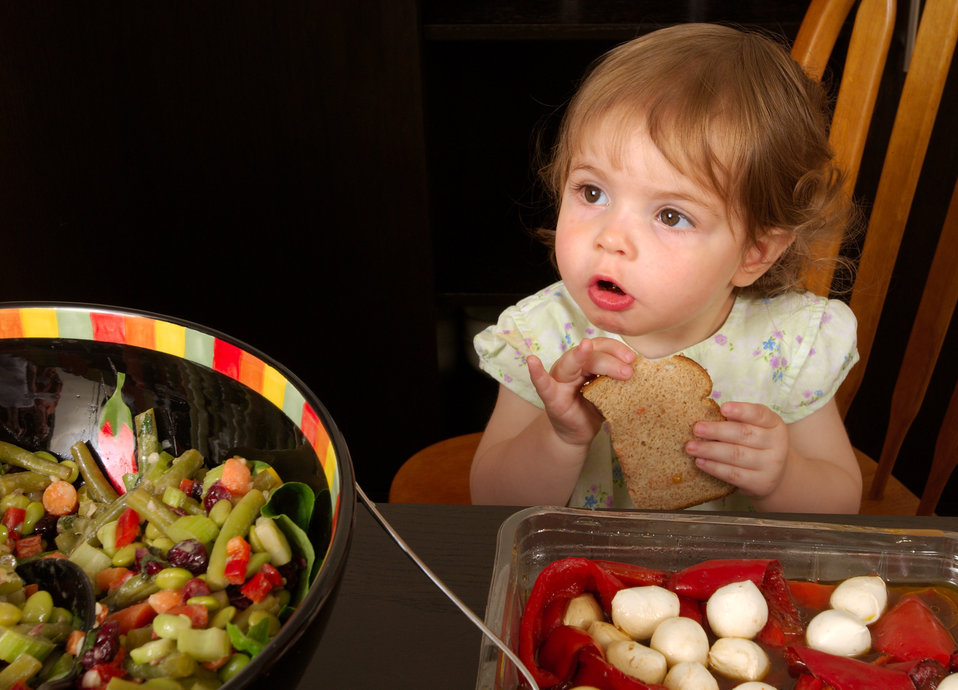
Intimacy with God requires the trust we learned very young.
Blessed are the poor in spirit, for theirs is the kingdom of heaven (Matthew 5:3).
This is the text of a sermon delivered at Transfiguration Episcopal Church, Rome, Georgia, August 26, 2018. The sermon lesson was John 6:56-69.
A major task of the toddler, roughly 18 to 36 months old, is to realize and enjoy her emerging bodily powers. Discover how to make a mudpie and taste it. Observe the arc of lemonade cascading from table to floor. Chase the kitty and try to catch its tail. Go where no pint-sized person has ever gone, with frequent check-ins with Mommy or Daddy.
Toddlers possess no power of judgment yet, save the intuitive knowledge that when lost, they need direction from someone much larger. This leads us to the dark side of parenting toddlers. We must teach them not to trust strangers. If a stranger offers candy or a puppy, turn on your heels immediately and return to Mommy, Daddy, or babysitter. Always. No exceptions.
We must teach them that because we taught them well a more important lesson in infancy, the first phase of life: how to trust. Yes, none of us remember our own infancy, how we learned trust. Moreover, when we taught our children trust, we scarcely realized that was what we were doing. The baby cried, and we had other things in mind besides trust, like changing a diaper, feeding a hungry tummy, or checking the body temperature. Yet, repeating that rite over and over, our children learned to trust by repetition and rehearsal. We taught them how to trust people by teaching them first how to trust us, whether we knew it or not.
Yet, even if we teach our children well how to trust, we must turn around and teach them not to trust strangers. There begins the long, countervailing narrative of fear and suspicion. If we trust everyone, someone will take advantage of us soon enough. We learn to listen for the flattering diversion, the leading comment, the seduction.
Meanwhile, just as the toddler desperately believes in her parents, we never lose the need to believe in someone. By the time we survive betrayals, heartbreaks, and other hard lessons of growing up, believing in someone takes maximum trust. Yet, worship is in our DNA, and we find someone.
Even the atheist finds someone to believe in, perhaps a postmodern philosopher or a stylishly skeptical professor or a Faustian celebrity who seems to have it all. If all else fails, there is always narcissism, the worship of oneself. But most of us gathered in sanctuaries like this one seek Someone beyond ourselves, Someone who seems to have inexplicably addressed us in the silence of a night, a story told by an odd uncle, or a song that drew tears totally by surprise.
Yet, precisely because such moments are so dear and frightening, because that need to believe in someone draws us into mystery like a two-year-old into the woods, we sense our control, our grasp of things slip into other hands. So we put our guard up. For self-protection, we domesticate the mysteries of God, reducing them to tall tales or anomalies scientists would explain away if they didn’t have better things to do.
This is not just a modern defense. Jesus confronted it in today’s text. In the only miracle story all four gospels tell, Jesus fed a crowd of five thousand with just a few loaves and fishes. This crowd already heard and saw enough to suspect that this man might be the One, or at least the emissary of the One they could finally believe in when all other gods fail. Like children after the Pied Piper, they crossed the Sea of Tiberias to catch him when they thought he almost got away.
The miracle also angered the religious authorities, the ones who claimed to domesticate the mystery in laws, practices, and traditions. They showed up to demystify him, to find their way to reduce him to a quack in the eyes of the wondering crowds. Ironically, Jesus gave his nemeses what they wanted even as he showed them up. He told a truth so deep, so challenging, so demanding of their trust that it drove away a sizable portion of the admiring crowd.
For starters, Jesus openly and cynically questioned the crowd’s motive for following him, telling them they came only for bread to stave off the next hunger. His offer for bread went over their head, a bread to transform them from fragmented, desperate seekers into their true selves, children who trust God enough to forget their bellies and seek the satisfaction of their souls. But that did not scare them off yet. They persisted, begging for whatever bread he had in mind.
“I am the bread,” he said, and their antennae sprouted. Every lesson they ever learned about not trusting strangers came back. Every embarrassment over gullibility to a con or braggart made them blush. Soon enough they forgot yesterday’s miracle.
For Jesus was not finished. He said they must eat his flesh and drink his blood. The religious authorities scoffed. How could anyone take seriously a man who employs such revolting imagery. Furthermore, the law disgraces cannibalism (e.g., Leviticus 26:27-30 and Deuteronomy 28:52-57) and explicitly forbids drinking blood (Leviticus 17:14). Not wanting to believe him, they left it at the literal level toddlers cannot get past and adults will not get past when they don’t want to know.
So they missed the main point, of course, as did even his disciples and as we might upon hearing these shocking images of eating his flesh and drinking his blood. Yet for Jesus, communicating in metaphors for any adult with ears to hear, these were images of intimacy. Like the bread that fed the masses yesterday and the manna that fed their ancestors in the wilderness, he, the Bread of Life, came from God to draw them nearer, just as he himself abides near God. Rather than coming to exploit them, he offered himself to nourish their growth in communion with God. You are what you eat, he seemed to say, and just as I am in an intimate, loving relationship with God, so if you take me into your very bodies you share in that intimacy.
The religious authorities snorted that they knew Jesus’ parents, knew his neighborhood, so he was a nobody like everybody else. They had enough, as Jesus knew they would. Painfully, he saw some of those who traveled far with him somberly nod their heads in agreement with the authorities and turn away, not only at the offense of the image of eating his flesh and drinking his blood but at the suggestion of such intimate love which demands so much trust.
What could we possibly want more than an intimate, loving bond with God? Yet, what could threaten us more? We would have no privacy. A Christ ever with us stirs about as we gossip, vote, rant on Facebook, and watch Netflix — loving us, yes, but holding up a mirror to the selves we try to escape in those spaces where we fancy ourselves safely alone with our own thoughts and childish fantasies.
Moreover, such intimacy with the divine drives away any pretense of being masters of our destinies and of our own houses. Intimacy with God is a kind of dying as falling in love always is, a dying that draws us into the mystery of the Other and guarantees that we will never be the same, we know not what. Intimacy with God is the kind of dying that risks any happiness secured with ego, work, and wits. It might taint our self-made image, make us look like we don’t have it all together. Yet, only intimacy with God will get us beyond the dumb luck and transience of mere happiness to the grace and eternality of joy.
Faith is not unreasonable. But reason is always faithful, always serving a passionate decision either to risk ourselves in a leap of love or to protect ourselves by circling our wagons around cherished fictions of self-sufficiency.
Why we worship Whom we worship, why we gather here in sanctuaries like this and march like children to the front for wafer and wine, body and blood, ultimately comes down to whether we do so because we have fallen in love so hard that we are willing to let our beloved under our skin to form and change us. It ultimately comes down to whether we look into the cold, night sky or the face of a peculiar stranger and expect the silence or the penetrating eyes to address us personally, intimately.
Whatever you hear, the voice says come. Eat my flesh. Drink my blood.
Do you dare listen? Do you dare come?


0 Comments